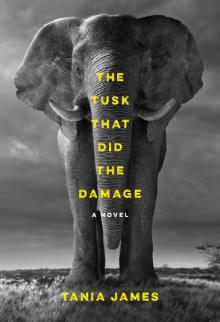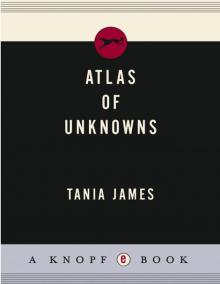- Home
- Tania James
Aerogrammes: And Other Stories
Aerogrammes: And Other Stories Read online
THIS IS A BORZOI BOOK
PUBLISHED BY ALFRED A. KNOPF
Copyright © 2012 by Tania James
All rights reserved. Published in the United States by Alfred A. Knopf, a division of Random House, Inc., New York, and in Canada by Random House of Canada Limited, Toronto.
www.aaknopf.com
Knopf, Borzoi Books, and the colophon are registered trademarks of Random House, Inc.
Portions of this work were originally published in the following: “The Gulf” in Boston Review; “Girl Marries Ghost,” in very different form, in The Courier-Journal; “Escape Key” in Five Chapters; “Ethnic Ken” and “Light & Luminous” in Five Points; “Lion and Panther in London” in Granta; “What to Do with Henry” in Kenyon Review; “Aerogrammes” in One Story; and “The Scriptological Review: A Last Letter from the Editor” in A Public Space.
Library of Congress Cataloging-in-Publication Data
James, Tania.
Aerogrammes : and other stories / Tania James.
p. cm.
eISBN: 978-0-307-95747-4
I. Title.
PS3610.A458A68 2012 813′.6—dc23 2011033755
This is a work of fiction. Names, characters, places, and incidents either are the product of the author’s imagination or are used fictitiously. Any resemblance to actual persons, living or dead, events, or locales is entirely coincidental.
Front-of-jacket illustration by Steven Attardo
Jacket design by Barbara de Wilde
v3.1
For Vivek
Contents
• • •
Cover
Title Page
Copyright
Dedication
Lion and Panther in London
What to Do with Henry
The Gulf
The Scriptological Review: A Last Letter from the Editor
Aerogrammes
Ethnic Ken
Light & Luminous
Escape Key
Girl Marries Ghost
Acknowledgments
A Note About the Author
Reading Group Guide
Other Books by This Author
Lion and Panther in London
• • •
The Sensation of the Wrestling World
Exclusive Engagement of India’s
Catch-as-Catch-Can Champions.
Genuine Challengers of the Universe.
All Corners. Any Nationality. No One Barred.
GAMA, Champion undefeated wrestler of India, winner of over 200 legitimate matches.
IMAM, his brother, Champion of Lahore.
(These wrestlers are both British subjects.)
£5 will be presented to any competitor, no matter what nationality, whom any member of the team fails to throw in five minutes.
Gama, the Lion of the Punjab, will attempt to throw any three men, without restriction as to weight, in 30 minutes, any night during this engagement, and competitors are asked to present themselves, either publicly or through the management.
NO ONE BARRED!! ALL CHAMPIONS CORDIALLY INVITED!!
THE BIGGER THE BETTER!!
Gama the Great is bored. Imam translates the newspaper notice as best he can while his brother slumps in the wing-back chair. On the table between them rests a rose marble chessboard, frozen in play. Raindrops wriggle down the windowpane. It is a mild June in 1910 and their seventh day in London without a single challenge.
Their tour manager, Mr. Benjamin, lured them here from Lahore, promising furious bouts under calcium lights, their names in every newspaper that matters. But the very champions who used to thump their chests and flex their backs for photos are now staying indoors, as if they have ironing to do. Not a word from Benjamin “Doc” Roller or Strangler Lewis, not from the Swede Jon Lemm or the whole fleet of Japanese fresh from Tokyo.
Every year in London, a world champion is crowned anew, one white man after the next, none of whom have wrestled a pehlwan. They know nothing of Handsome Hasan or Kalloo or the giant Kikkar Singh, who once uprooted an acacia tree bare-handed, just because it was disrupting the view from his window. Gama has defeated them all, and more, but how is he to be Champion of the World if this half of the world is in hiding?
Mr. Benjamin went to great trouble to arrange the trip. He cozied up to the Mishra family and got the Bengali millionaires to finance the cause, printed up press releases, and rented them a small, gray-shingled house removed from the thick of the city, with space enough out back to carry on their training. The house is fairly comfortable, if crowded with tables, standing lamps, settees, and armchairs. When it rains, they push the furniture to the walls and conduct their routines in the center of the sitting room.
Other adjustments are not so easy. Gama keeps tumbling out of bed four hours late, his mustache squashed on one side. Imam climbs upon the toilet bowl each morning, his feet on the rim, and engages in a bout with his bowels. Afterward, he inspects the results. If they are coiled like a snake ready to strike, his guru used to say, all is in good shape. There are no snakes in London.
These days, when Mr. Benjamin stops by, he has little more to offer than an elaborate salaam and any issues of Sporting Life and Health & Strength in which they have been mentioned, however briefly. He is baby-faced and bald, normally jovial, but Imam senses something remote about him, withheld, as though the face he gives them is only one of many. “You and your theories,” Gama says.
Left to themselves, Gama and Imam continue to hibernate in the melancholy house. They run three kilometers up and down the road, occasionally coughing in the fume and grumble of a motorcar. They wrestle. They do hundreds of bethaks and dands, lost in the calm that comes of repetition, and at the end of the day, they rest. They bathe. They smooth their skin with dry mustard, which conjures homeward thoughts of plains ablaze with yellow blooms. Sometimes, reluctantly, they play another game of chess.
On the eighth morning, Mr. Benjamin pays a visit. For the first time in their acquaintance, he looks agitated and fidgets with his hat. His handshake is damp. He follows the wrestlers into the sitting room, carrying with him the stink of a recently smoked cigar.
The cook brings milky yogurt and ghee for the wrestlers, tea for Mr. Benjamin. Gama and Imam brought their own cook from Lahore, old Ahmed, who is deaf in one ear but knows every nuance of the pehlwan diet. They were warned about English food: mushy potatoes, dense pies, gloomy puddings—the sort of fare that would render them leaden in body and mind.
When Mr. Benjamin has run out of small talk, he empties a sober sigh into his cup. “Right. Well, I suppose you’re wondering about the tour.”
“Yes, quite,” Imam says, unsure of his words but too anxious to care. It seems a bad sign when Mr. Benjamin sets his cup and saucer aside.
Wrestling in England, Mr. Benjamin explains, has become something of a business. Wrestlers are paid to take a fall once in a while, to pounce and pound and growl on cue, unbeknownst to the audience, which nevertheless seems to enjoy the drama. After the match, the wrestlers and their managers split the money. Occasionally these hoaxes are discovered, to great public outcry, the most recent being the face-off between Yousuf the Terrible Turk and Stanislaus Zbyszko. After Zbyszko’s calculated win, it was revealed that Yousuf the Terrible was actually a Bulgarian named Ivan with debts to pay off.
“And you know of this now only?” Imam asks.
“No—well, not entirely.” Mr. Benjamin pulls on a finger, absently cracks his knuckle. “I thought I could bring you fellows and turn things around. Show everyone what the sport bloody well should be.”
Imam glances at Gama, who is leaning forward, gazing at Mr. Benjamin’s miserable face with empathy.
&nbs
p; “There would be challengers”—Mr. Benjamin shrugs—“if only you would agree to take a fall here and there.”
After receiving these words from Imam, Gama pulls back, as if bitten. “Fall how?” Gama says.
“On purpose,” Imam explains quietly.
Gama’s mouth becomes small and solemn. Imam tells Mr. Benjamin that they will have to decline the offer.
“But you came all this way.” Mr. Benjamin gives a flaccid laugh. “Why go back with empty pockets?”
For emphasis, Mr. Benjamin pulls his own lint-ridden pockets inside out and nods at Gama with the sort of encouragement one might show a thick-headed child.
Gama asks Imam why Mr. Benjamin is exposing the lining of his pants.
“The langot we wear, it does not have pockets,” Imam tells Mr. Benjamin, hoping the man might appreciate the poetry of his refusal. Mr. Benjamin blinks at him and explains, in even slower English, what he means by “empty pockets.”
So this is London, Imam thinks, nodding at Mr. Benjamin. A city where athletes are actors, where the ring is a stage.
In a final effort, Mr. Benjamin takes their story to the British press. Health & Strength publishes a piece entitled “Gama’s Hopeless Quest for an Opponent,” while Sporting Life runs his full-length photograph alongside large-lettered text: “GAMA, the great Indian Catch-Can Wrestler, whose Challenges to Meet all the Champions have been Unanswered.” The photographer encouraged Gama to strike a menacing pose, but in the photo, Gama appears flat-footed and blank, his fists feebly raised, a stance that wouldn’t menace a pigeon.
Finally, for an undisclosed sum, Doc Roller takes up Gama’s challenge. Mr. Benjamin says that Doc is a fully trained doctor and the busiest wrestler in England, a fortunate combination for him because he complains of cracked ribs after every defeat.
They meet at the Alhambra, a sprawling pavilion of arches and domes, its name studded in bulbs that blaze halos through the fog. Inside, golden foliage and gilded trees climb the walls. Men sit shoulder to shoulder around the roped-off ring, and behind them, more men in straw boaters and caps, standing on bleachers, making their assessments of Gama the Great, the dusky bulk of his chest, the sculpted sandstone of each thigh. Imam sits ringside next to Mr. Benjamin, in a marigold robe and turban. He is a vivid blotch in a sea of grumpy grays and browns. He feels slightly overdressed.
Gama warms his muscles by doing bethaks. He glances up but keeps squatting when Roller swings his long legs over the ropes, dauntingly tall, and whips off his white satin robe to reveal wrestling pants, his abdominal muscles like bricks stacked above the waistband.
They take turns on the scale. Doc is a full head taller and exceeds Gama by thirty-four pounds. Following the announcement of their weights, the emcee bellows, “No money in the world would ever buy the Great Gama for a fixed match!” To this, a hailstorm of whooping applause.
Imam absently pinches the silk of his brother’s robe, which is draped across his lap. Every time he watches his brother in a match, a familiar disquiet spreads through his stomach, much like the first time he witnessed Gama in competition.
Imam was eight, Gama twelve, when their uncle brought them to Jodhpur for the national strong-man competition. Raja Jaswant Singh had gathered hundreds of men from all across India to see who could last the longest drilling bethaks. The competitors took their places on the square field of earth within the palace courtyard, and twelve turbaned royal guards stood sentinel around the grounds, their tall gold spears glinting in the sun. Spectators formed a border some meters away from the field, and when little Gama emerged from their ranks and joined the strong men, laughter trailed behind him. Gama was short for his age but hale and sturdy even then.
When the raja raised his hand, Gama began, up and down, steady as a piston. His gaze never wavered, fixed on a single point of concentration in the air before him, as if his competitors and critics had all dissolved into the heat. At some point, Imam wanted to sit in the shade, but his uncle refused to move, too busy staring at Gama, as if with every bethak, the boy was transforming into something winged and brilliant. When Imam complained about the sun, his uncle said, “Look at your bhaiya. Does he complain?”
Imam looked at his brother: serene and focused, impervious to pain—everything Imam was not. There was a gravity about Gama in his youth, as if he had been schooled from the womb in the ways of the pehlwan, to avoid extremes of emotion like rage and lust, to reserve his energies for the pit. Their father had begun Gama’s training at age five and died three years later, before Imam could prove himself worthy of the same attention.
The bethak contest lasted four hours, and by the end, only fifteen men remained standing. Raja Singh yanked Gama’s hand into the air, declaring him the youngest by far and, thus, the winner. Greased in sweat, Gama wore a funny, dreamy expression, listing slightly before his knees buckled. Seeing him this way—limp, waxy, the crescent whites of his eyes between his lashes—made something jerk in Imam’s chest. He could not move. At that moment, Imam began to hate his uncle. He hated the raja for coming up with this contest, and he hated every person who herded around his brother and blocked out the sun, claiming him as if he were theirs.
•
The bell clangs, and the match with Roller begins. Gama slaps his thighs, beats his chest, charges. He plunges at Doc’s leg. Doc evades him the first time, but not the second. With a smooth back heel, Gama fells him and finishes him off with a half nelson and a body roll. One minute and forty seconds.
The second fall happens in but a blur—Doc laid out on his belly, sweat-slick and wincing at the spectators in the front row, who lean forward with their elbows on their knees. Roller gives in, and then: bedlam. The emcee yanks Gama’s hand into the air; men mob the mat like sparrows to a piece of bread. Mr. Benjamin wrings Imam’s hand, then shoulders his way through the crowd. Imam hangs back, Gama’s robe in his arms, craning his neck to see over all the hats and heads between him and his brother.
Over the next few days, Gama defeats two more challengers, sends them staggering to the mat like drunken giants. The newspapers have begun to take notice. Sometimes, while warming up, Gama and Imam spot a reporter watching from the road, the brim of his hat shadowing his eyes as he scribbles something in his notebook. Imam doesn’t like being ogled while doing his dands, but Mr. Benjamin has told them not to shoo the scribblers away. Press, he says, breeds more press.
Mr. Benjamin is right. These days, he brings more clippings than ever before, and Gama wants to digest every word, his appetite inexhaustible. Imam would rather play chess, the only game at which he consistently beats his brother. The journalists rarely, if ever, mention him.
“Gama the Great,” writes Percy Woodmore in Health & Strength, “has so handily defeated all his European challengers that one can only wonder whether the Oriental strong man possesses some genetic advantage over his Occidental counterpart.” Imam can recognize barely half the words in this sentence, but he understands the next: “Will the Hindoos ever lose?”
“Do you know,” Gama interjects, “these sahibs have so few counters—only one to the cross-buttock hold.” Gama shakes his head in bemusement, and just when Imam thinks he cannot stand him a minute longer, Gama adds, “Wait till they see you in the ring.”
Imam is beginning to wonder if that day will ever arrive. He feels the distinct weight of malaise, same as he used to suffer in school. When they were children, Gama got to train at the akhara with Madho Singh, while Imam had to recite English poems about English flowers. After Gama’s triumph at Jodhpur, people talked as if the boy could upend mountains, greater than all the pehlwan ancestors who had preceded him.
Sometimes, if Imam was sitting alone, sullenly reciting his multiplication tables, Gama took pity on him. “Come on, chotu,” he’d say, taking Imam outside to show him a new hold. Gama was the only one who called him chotu, a word that raised his spirits when nothing else would.
By age twelve, Imam was fed up. He began cutting school and hoveri
ng around the akhara, where the only language that mattered was the heave and grunt of bodies in constant motion, whether climbing the rope hanging from the neem tree, or hoeing the wrestling pit, or swinging a giant jori in each arm, spiky clubs that surpassed him in height. Moving, always moving. The akhara seemed a splendid hive unto itself, sealed off from mundane concerns like school and exams and the sting of the teacher’s switch. Here was his classroom. Here, among the living, was where he belonged.
•
Finally Mr. Benjamin arranges a match for Imam. He is to take on the Swede Jon Lemm, who has won belts from both the Alhambra and Hengler’s tournaments.
They meet at the Alhambra once again, to a sold-out arena. Imam has the advantage of height but feels gangly next to Lemm, who is a stout tangle of muscle, and pale, with eyes of a clear, celestial blue.
The referee summons them to the center of the mat. Lemm gives a cordial nod and locks Imam in a hard handshake before releasing him to his corner. Imam can feel the spectators watching him, murmuring. One fellow openly points at Gama, who seems not to notice, sitting beside Mr. Benjamin with an air of equanimity. There is a proverb that their forefathers minded for centuries: Make your mind as still as the bottom of a well, your body as hard as its walls.
Imam touches the mat, then his heart.
The bell clangs, and Lemm hurls himself at Imam; his back heel topples Imam onto his back. Imam slips free, darts around Lemm, quick as the crack of a whip. He does not see Lemm in terms of ankle and knee and leg. Instead he tracks Lemm’s movements, listening for one false note—the falter, the doubt, the dread.
At one point Lemm stalls, a fatal mistake. Imam lunges, lifts him up, and hurls him to the mat. He flips the bucking Swede and pins him. Three minutes and one second.
Not long into the second bout, Lemm is sprawled out on the mat, Imam on his back. Imam can feel Lemm struggling beneath him, trembling down to his deepest tissues until, with a savage groan, he deflates. One minute and eight seconds.

 Aerogrammes: And Other Stories
Aerogrammes: And Other Stories Aerogrammes
Aerogrammes The Tusk That Did the Damage
The Tusk That Did the Damage ATLAS of UNKNOWNS
ATLAS of UNKNOWNS